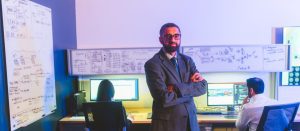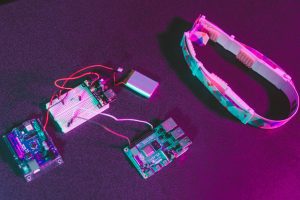|
Getting your Trinity Audio player ready...
|

It happened without warning.
Vanessa Vazquez’s son, Max Lucca, was at the kitchen table doing homework after school. He stood up to sharpen a pencil. Then, suddenly he began shaking uncontrollably. Inside his brain, a storm of electrical activity was raging, messages firing in a frenzy and overloading normal function.
The 14-year-old was having his first epileptic seizure. It would not be his last.
Epilepsy is a chronic, lifelong condition without a cure. For Vazquez, it’s a shadow of unbearable unknowing that falls over every moment. When will her son have a seizure? Will she be there to make sure he’s safe? Unlike other kids his age, Max Lucca’s life is marked by limitations. No bicycle rides on his own. No swimming on his own. The fact a seizure could strike at any time makes too many activities dangerous.
But if the next one could be predicted, parents like Vazquez would have time to prepare and kids like Max Lucca could just be kids.
Taking the unpredictability out of seizures is the goal of FIU data scientist and associate professor in the Knight Foundation School of Computing and Information Sciences Fahad Saeed’s research.

With the help of artificial intelligence (AI), he’s creating advanced machine learning models capable of doing what no human can — parse through electroencephalography (EEG) data to track unusual electrical activity that spark seizures. His technology will be incorporated into wearable sensors that feed information to a smartphone. Any detected irregularities in brain waves would signal trouble, prompting an early alert notification.
“Right now, there’s no other solution or technology that can predict seizures. They can only be detected while they’re happening,” Saeed said. “An early alert would give people precious time to prepare and take safety precautions. For parents like Vanessa, it would give them peace of mind to at least put their kids to bed at night.”
Being terrified of putting a child to sleep at night something Saeed heard over and over when he spoke to parents of children with epilepsy. Even at the very start of his NSF-funded research, he knew he needed to hear from the people who’d benefit most from his results. So, he connected with dozens of families.
Vanessa Vazquez shared Max Lucca’s story with Saeed. How at two-weeks old he was diagnosed with tuberous sclerosis complex (TSC), a rare disorder that causes benign tumors to grow in the brain and other organs — and put him at increased risk of epilepsy. How after his first seizure he was prescribed one seizure medication after another. Each option caused horrible side effects, seeming to do more harm than good, finally forcing Vazquez to make the difficult decision to take her son off the medications and instead live with the anxiety of uncertainty.
As the father of two children, Saeed says every story he heard broke his heart. The fear and pain of having to witness your child having a seizure, sometimes multiple times a day, were unfathomable to Saeed.
These difficult conversations became his guidance, though. Saeed says they’ve made his research better, taking it in a more impactful direction.
“Impact is what I’m after and to conduct research that can be translated from lab to real life,” Saeed said. “The conversation with the parents helped me really refine what this technology will actually look like in the real world.”

Before his AI-based model can be incorporated into a wearable EEG device, Saeed remains focused on perfecting the science behind the technology. His algorithm currently predicts with 90% accuracy when a seizure might happen, but next he has to train and test how it handles simulated EEG in real time before it can be studied on people. To prepare for those human trials, Saeed is connecting with organizations like Epilepsy Florida Foundation and TSC Alliance, to explore ways to collaborate and continue making sure the product fits real-world needs.
“Even if I have the best research and the best intentions, there’s no way I can make an impact by myself,” Saeed said. “It’s only with the help of the community, especially parents of kids who live with epilepsy, that we can accomplish something lifechanging.”
Lifechanging is exactly how Vazquez describes Saeed’s research. The list of what Max Lucca cannot do would change to what he can do. He’d finally get to ride a bike down the street with friends — without his parents being around.
“Dr. Saeed’s research would let kids be kids, and enjoy the things other kids can do without thinking — normal everyday things like ride a bike or go to friends’ houses to play,” Vazquez said. “That would change everything for families like mine.”
Read more about Saeed in the upcoming FIU Research Magazine. This annual publication, slated for release in April, will feature in-depth reporting on the people and innovative groundbreaking research that have helped drive FIU’s rise in the rankings. If you would like to receive a copy, email researchmag@fiu.edu.





